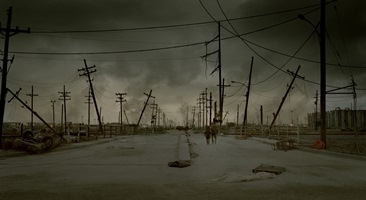THE THEOLOGICAL ENGINEER
Rated "N" FOR Nihilism
By Jeff Laird

Films do more than just tell stories; they frame those stories in a world purpose-built to support the vision of the filmmaker. In a literal sense, the movie controls how we respond to the subject matter, in ways we might not have responded were the same story in print, or even seen in person. This is why even the most faithful film adaptation of a book seems impersonal — you are no longer the one in control of the details! This makes the worldview of a film just as important as the content, if not more so.
An increasingly common worldview framing films is nihilism — the idea that nothing ultimately matters. For some, nihilism is not so much depressing as it is liberating. When the universe lacks meaning and purpose, moral constraints are passé, and one can do as they please with a clear conscience. One could say that purposelessness has a purpose, and meaninglessness is meaningful, when you're willing to make something out of nothing. Technically, that's gibberish, but it's not an unfair assessment of the postmodern approach. Non-theists such as Friedrich Nietzsche, Aldous Huxley, Thomas Nagel, and Stephen Jay Gould have been famously quoted to that very effect.
Most of these films are depressing, bleak, or even disturbing. Nihilistic movies rely on a heavy sense of fate, futility, or helplessness. Some feature intense suffering and pain, but no happy endings. Some have no ending to speak of, other than the story just stops. The ultimate payoff for all this stark pessimism is a reinforcement of the postmodern worldview: none of this mattered, and, in fact, nothing matters. Make no mistake, nihilism isn't just a theme of low-budget B-movies. Consider the following examples of nihilism in recent films (spoilers):
In The Road (2009), it's hinted that the unexplained worldwide apocalypse has doomed all life on earth; it's just a matter of time. The unnamed father's efforts to protect his son are constantly juxtaposed against this inevitable fate. Every violent or disturbing encounter, including the father's eventual death, underscores the same theme: none of this is going to matter in the end.
In Collateral (2004), assassin Vincent sums up his nihilistic outlook with a prophetic story about a dead man riding the subway for hours before being noticed. He also minimizes his own actions with references to African genocide. The death of a pursuing police detective is inherently nihilistic: it's unexpected, quick, and more or less forgotten as the film continues, despite his prior importance as a character.
The ending of The Mist (2007) is supremely nihilistic, as people are slaughtered by demonic creatures despite their best efforts. Along the way, religious beliefs are portrayed as dangerous and insane, something unsurprising to those familiar with the writing of the story's author, Stephen King. In the end, the main character shoots his son and several others with his last bullets, rather than see them succumb to the monsters lurking in the fog. No sooner has he done this, than the mist clears and rescue arrives, and the film abruptly ends.
One character of The Grey (2011) keeps the wallets of his fellow Alaskan plane crash survivors, as they are brutally killed one-by-one by wolves and weather. Symbolically, the summary of their lives is nothing more than a small pile of leather and plastic. Eventually, a single survivor is left alone to curse God for not helping him, moments before he himself is killed by wolves. Even the collection of wallets is lost to the wilderness.
These are just a few examples. One could argue for nihilistic themes in other major films such as No Country For Old Men 2007), Cloverfield (2008), and even recent Batman offerings, such as The Dark Knight (2008).
All of these movies explore concepts beyond pure nihilism, of course. For instance, The Mist provides ham-handed allegories against both neo-conservatism, and religious fundamentalism. The Grey is partly an exploration-slash-attack on religious faith, and both The Grey and The Road delve into how our personal sense of morality is affected by catastrophe. Collateral questions how we rationalize our decisions when they don't match our beliefs. Yet, nihilism in films primarily supports the general trend towards postmodernism. They tell us that everyone is going to get the same thing in the end, and most of our lives are out of our control. So, we might as well believe and act as we please.
Perhaps the clearest illustration of this purpose is prevalent use of the color gray. Vincent, the assassin of Collateral, is gray-haired, and wears a gray suit. The entire earth is a dirty, dusty gray in The Road. The dense fog of The Mist, as well as many of its creatures, are a shade of gray. The antagonists of The Grey are gray wolves. This is no accident, as gray has long been symbolic of blurred lines, relativism, and uncertainty, as well as despair and fatalism.
Movies not only engage us in visual and audible content, they immerse us in a particular worldview. As Christians, we need to be sensitive to the philosophical effects of a film, just as much as we are the effects of images and sounds. Nihilism is just one worldview espoused in modern movies, but it's one few recognize. It's not merely what the characters say and do, it's also the lesson we're meant to learn that counts. With apologies to nihilism itself, that matters, and it matters a great deal.
Image credit: The Road
Tags: Christian-Life | Reviews-Critiques
comments powered by Disqus
Published 12-02-13

